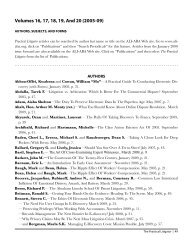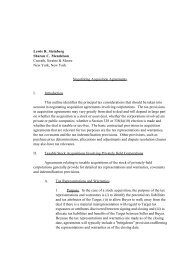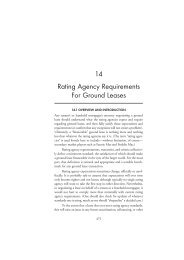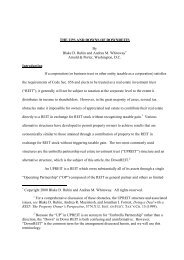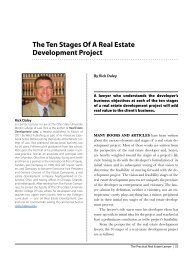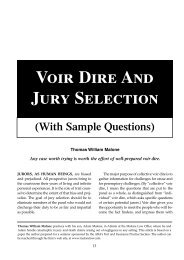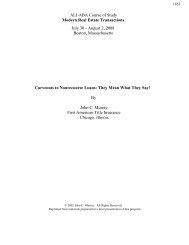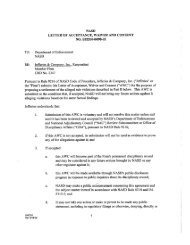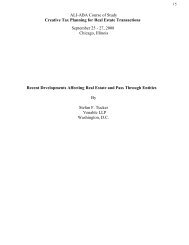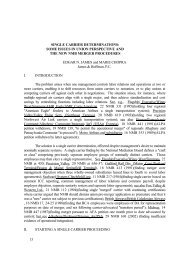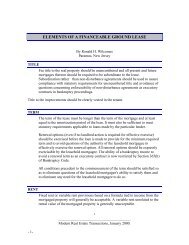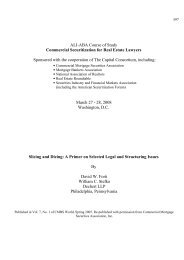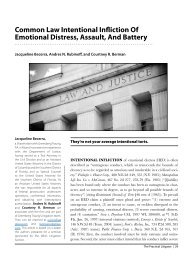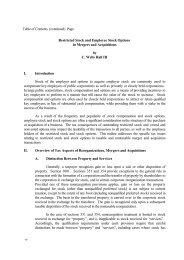ALI-ABA Course of Study Modern Real Estate Transactions July 25 ...
ALI-ABA Course of Study Modern Real Estate Transactions July 25 ...
ALI-ABA Course of Study Modern Real Estate Transactions July 25 ...
You also want an ePaper? Increase the reach of your titles
YUMPU automatically turns print PDFs into web optimized ePapers that Google loves.
2244<br />
rent) 7 ; Chanslor-Western Oil & Development Co. v. Metropolitan Sanitary<br />
District, 131 Ill. App. 2d 527, 266 N.E.2d 405 (1970) (holding that the<br />
district acted unreasonably in conditioning consent to sublease on<br />
reappraisal <strong>of</strong> rent); 1010 Potomac Assoc. v. Grocery Manufacturers, 485<br />
A.2d 199 (D.C. App. 1984) (holding that Landlord acted unreasonably in<br />
withholding consent to a sublease <strong>of</strong> an option period solely to extract<br />
additional rent) 8 ; Economy Rentals, Inc. v. Garcia, 112 N.M. 748, 819<br />
P.2d 1306 (1991).<br />
3. Type III Restrictions: Prohibition Without Landlord’s Consent. This type<br />
<strong>of</strong> clause omits an express requirement that the Landlord be reasonable in<br />
withholding its consent. When a lease contains this type <strong>of</strong> restriction and<br />
a Landlord has asked for a fee or increased rental as a condition to its<br />
consent to an assignment or sublease, the court must first decide whether it<br />
will impose an implied covenant <strong>of</strong> good faith or reasonableness on the<br />
Landlord. In general, courts from jurisdictions that cling to the majority<br />
rule allowing refusal <strong>of</strong> consent do not prohibit the Landlord from<br />
conditioning his consent to an assignment or sublease on an increased<br />
rental. Courts from jurisdictions imposing the reasonableness standard,<br />
however, generally hold that such conditional consent is forbidden.<br />
i. Jurisdictions following the "majority" rule. In general, courts<br />
in jurisdictions that have not adopted the implied covenant <strong>of</strong><br />
commercial reasonableness will allow the Landlord to condition its<br />
consent on an increased rental or a fee. Courts following the<br />
majority rule generally reason that if the parties wished to<br />
incorporate a standard <strong>of</strong> reasonableness, they were free to do so<br />
when the lease was drafted. These courts generally refuse to<br />
"rewrite" the clear and unambiguous language <strong>of</strong> a lease<br />
agreement. See Illinois Central Gulf Railroad Co. v. International<br />
Harvester Co., 368 So. 2d 1009 (La. 1979) (holding that Landlord<br />
could withhold consent for purely economic reasons); B & R Oil<br />
Co. v. Ray’s Mobile Homes, Inc., 422 A.2d 1267 (Vt. 1980).<br />
ii.<br />
Jurisdictions following the "minority " rule. In these<br />
jurisdictions, the court adopted the "minority" position, imposing<br />
7 The court noted that the Landlord failed to provide an adequate reason for denial <strong>of</strong> the<br />
assignment, particularly since the original Tenant had unequivocally guaranteed performance <strong>of</strong><br />
all tenant covenants under the lease, the Landlord did not question the solvency <strong>of</strong> the proposed<br />
Tenant, no alterations to the premises were necessary in order to convert the same for the<br />
proposed use, and the Landlord did not object to the nature <strong>of</strong> the proposed Tenant’s use.<br />
8 The Potomac court reasoned that the purpose <strong>of</strong> a consent provision in any assignment/sublease<br />
clause is to protect the landlord’s ownership and operation <strong>of</strong> the particular property, not to<br />
protect the landlord’s general economic condition. Relying on the “rule” that the legal remedy <strong>of</strong><br />
damages is presumed to be inadequate in disputes involving real property, the court granted the<br />
lessee specific performance.<br />
QBMKE\5419766.5 18



